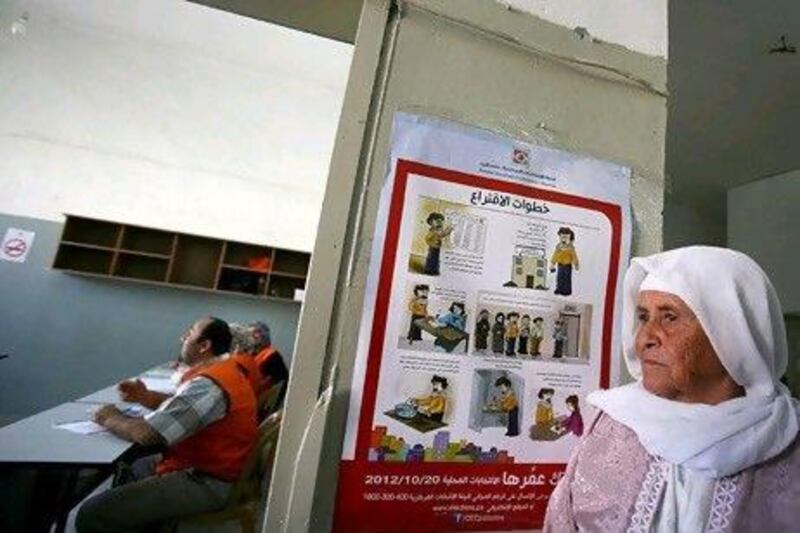SAFFA, WEST BANK // Enthusiasm for yesterday's Palestinian elections couldn't seem lower, but at least one key demographic hoped the vote would offer them inroads into a political system they criticise as patriarchal and discriminatory.
More than a thousand women ran in the first municipal council elections, the first to be held in the Palestinian territories in seven years and the only national vote of any sort since the 2006 parliamentary election.
Yesterday's election was notable because of the two all-women lists of candidates running in Hebron and Saffa.
In Saffa, a village with a population of 5,000 near Ramallah, Ilham Sami's Women of the Country had an eclectic mix of the religiously conservative, a feminist and a fashion designer on its list.
They hope to change a society whose institutions have historically been dominated by men.
"The system that's been created gives the spoils of being in power to the families," said Ms Sami, 48, a women's rights advocate and PA employee.
The women in Saffa ran on a platform of equitable distribution of municipal services. The current nine-member council, Ms Sami said, had a history of doling out services in favour of the community's politically connected families.
She called this a consequence of the "patriarchal family system that men control", adding that many of Saffa's residents had "only the same idea of women - as kitchen workers or objects who toil at home".
The women had received a warm reception from residents, she added.
In Hebron, 11 another list of all-women candidates calling itself 'By Participation, We can'' campaigned on gender equality. Its eleven candidates also wanted to offer an alternative to the establishment parties of this West Bank city's conservative and clan-dominated politics.
Only 16 per cent of women in the West Bank are employed, and in Hebron the number drops to 10 per cent.
While all-women voting lists are rare in electoral politics here, women have long been politically active in Palestinian politics and some hold office in the government run by the PA. There are six female ministers in the 24-member Cabinet of western-backed Palestinian prime minister Salam Fayyad.
In the 1996 presidential election, the late Yasser Arafat's faced only one challenger, Samiha Khalis - a woman.
Palestinian law mandates a 20 per cent quota for women on municipal councils, but yesterday about a quarter of the 4,700 candidates were women, according to the Central Elections Commission (CEC), the body that administers elections in the Palestinian territories.
CEC officials expect to announce results today.
But while eyeing election victory, both Women of the Country and By Participation, We Can enter politics at a time of deep cynicism of a national leadership that is bitterly divided and struggling to end 45 years of Israeli occupation.
That scepticism was palpable during yesterday's vote that was limited to the Fatah-led West Bank. The Islamist movement Hamas, which administers the Gaza Strip, boycotted the it.
As a result, competition seemed less than fierce. Of the West Bank's 353 districts, 181 did not hold a vote because only one party was competing.
"People know these elections won't have any impact," Issa Nicol, 38, a contractor who works in Ramallah, said yesterday, adding that local councils are practically "powerless" institutions. He did not vote.
Hamas won a surprising majority of seats in legislative election of 2006, setting into motion the conflict with Fatah. That was the last national ballot held in the Palestinian territories and precipitated the Islamist group's takeover of Gaza from Fatah a year later.
Since then, the factions have been unable to mend their differences, which has led to several delays in holding elections.
Sam Bahour, an American-Palestinian businessman and activist in Ramallah, was hopeful all-female candidate lists could help to reinvigorate Palestinians' political participation.
"It's a first step in a long road to having a functioning political system because elections help us understand what our communities want and need," he said.
Still, he called yesterday's elections "flawed" because they did not include Gaza.
Others were more enthusiastic. Khaled Al Afroukh, 40, proudly waving a thumb covered in blue ink from stamping a ballot, said yesterday that 800 members of his extended family came out to vote in Ramallah.
"We're proud to show we are a people who believe in democracy," said Mr Al Afroukh. His entire family voted for one list, he added, which is linked to the Fatah faction.
But this is exactly that sort of voting behaviour that compelled Women of the Country to run on a platform of justice.
The group had already begun devising a shadow council made up of all women that would monitor the elected, said Ms Sami.
Women, she said, "should be political".
hnaylor@thenational.ae
Associated Press





